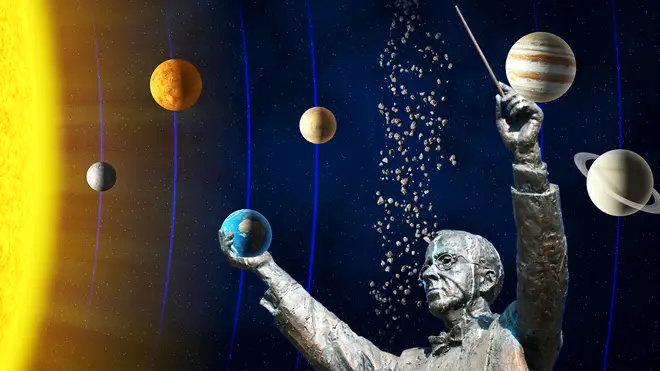Why did Holst leave Earth out of his orchestral suite, The Planets?
19 September 2024, 12:32

Holst’s great astrological suite has given us some of the most memorable melodies ever written. But why is there one planet missing?
Listen to this article
Gustav Holst’s most famous and beloved work, The Planets, is a musical exploration of the planets that make up our solar system. The great English composer assigned characters and a subtitle to each movement, according to their astrological meaning.
Best known are ‘Mars, the Bringer of War’, with its relentlessly militaristic snare drum and ominous, forceful brass chords, and ‘Jupiter, the Bringer of Jollity’, which would later lend its melody to the majestic anthem, ‘I Vow to Thee, My Country’.
Read more: A beginner’s guide to Gustav Holst’s ‘The Planets’ Suite
At the time that Holst was writing his orchestral suite between 1914 and 1917, Neptune was the most far away planet discovered in the solar system, and very little was known about it.
It’s for this reason that Holst named it ‘the Mystic’, and ended the piece with a wordless, offstage women’s chorus that gradually fades to silence, as Holst’s planetary scope drifts out into the unknown universe beyond...

Symphony orchestra’s magnificent ‘Jupiter’ at Royal Albert Hall | Classic FM Live
But hold on a minute – where’s Earth?
Astute readers may have noticed that Holst’s The Planets has seven movements for seven planets – but aren’t there eight in our solar system? Indeed there are, and Holst had an incredibly simple, yet logical reason for excluding one...
But first, there’s some important context to get to grips with.
Holst would famously become consumed with various topics that inspired his compositions, firstly Sanskrit, and later the stars.
Read more: This Billie Eilish song is based on a Gustav Holst hymn with a 3,000-year-old Sanskrit text
The original idea for the composition came to the composer while on holiday in Spain with composer Arnold Bax and his brother, Clifford. The three got onto the subject of astrology, and Holst was clearly enthralled.
Not long after his return to England, he wrote to a friend: “I only study things that suggest music to me... and I have been studying astrology fairly closely”.
So if astrology is the foundation underscoring The Planets, well then it makes perfect sense that Earth was left out – it has no bearing on astrology or horoscopes, since the entire study of astrology is based around other planets’ locations in relation to Earth.

Amazing performance of Mars from Holst's Planets Suite seen from Lo-Fi Orchestra DIY project
But is The Planets really about astrology?
Arguably, no. That may have been Holst’s initial inspiration, and indeed his intention, but in actuality his characterisations have more to do with ancient mythology than the zodiac.
His titles for Mercury (‘the Winged Messenger’) and Neptune (‘the Mystic’) seem to have been taken from a book by Alan Leo, who was nicknamed ‘the father of modern astrology’. But as for the rest of them, Holst might have taken some liberties.
Many of the planetary pieces have more attributes in common with their Roman deity counterparts than astrological meanings. Meanwhile, it’s not quite clear what Saturn did to earn the title ‘the Bringer of Old Age’, but it must have really upset Holst.
In a biography of the composer, Michael Short stressed that the music came first and foremost for Holst. The composer literally rearranged the solar system – musically, at least – to better suit his artistic vision. Talk about going to extreme lengths.
Read more: Watch Holst’s ‘The Planets’ performed on the piano it was composed on
Dare I ask about Pluto...?
Pluto was discovered in 1930, just four years before Holst died. Holst was still very much active as a composer, and was asked at the time whether or not he planned on writing an eighth movement.
(This was, of course, before Pluto was demoted to dwarf planet status.)
Alas, Holst had little interest in expanding his suite. He was somewhat irritated that the popularity of The Planets was overshadowing some of his other works. In other words, the faster the world moved on, in his opinion, the better.












